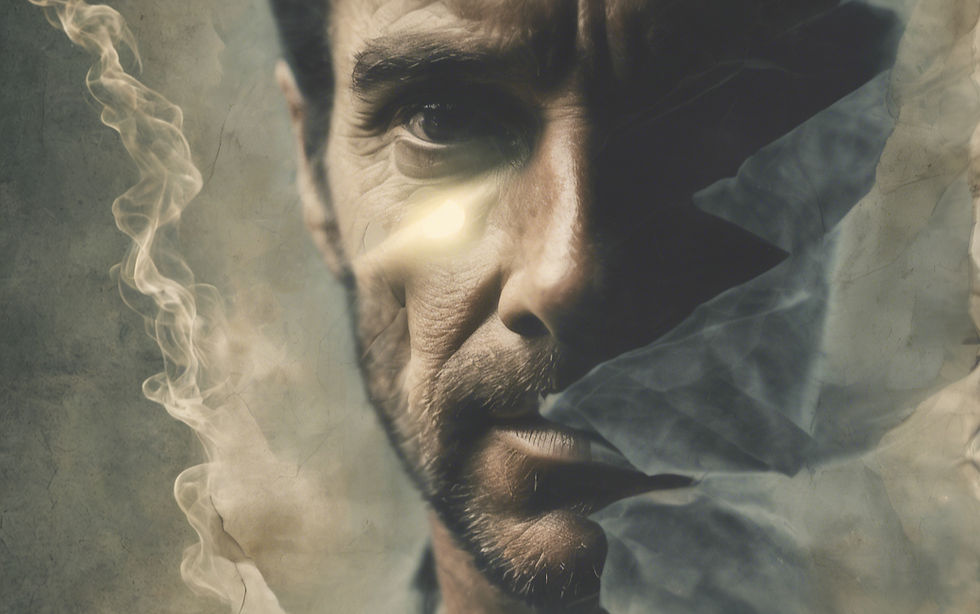Addiction: The Ghost Within
- John Raynaud

- Aug 13, 2025
- 4 min read
Addiction wraps around our pain, our fears, and our traumas like a comforting shroud. It protects us from and softens life’s sharpest edges, but it also isolates us. What begins as relief ends up distorting reality and turns us into haunted ghosts.
It took me many years to realise my addiction was an attempt to comfort myself from unresolved childhood abandonment trauma and the consequences of a rough adolescence.

As a young man I desperately needing the guidance and boundaries that should have come from a stable family life. While addiction soon turned me into an abstract ghost in my own life, these coping mechanisms felt to be the only way I could preserve the faint flicker of meaning in my life — a faint flame that, despite everything, still burned and held hope for the fulfilling life I longed for that could one day become reality.
Reframing Addiction and Dependence
Addiction offers the illusion of comfort to our unmet needs, painful experiences, and the quiet ache of existential emptiness. Whether we depend on food, drugs, alcohol, gambling, or other addictive behaviours to cope, this dependence chokes the genuine warmth of human connection, and more poignantly, the warmth of authentic core identity. When hopelessness replaces hope and what we once cared about becomes meaninglessness, we may be surviving but we are far from thriving.
I see the ‘ghost in us’ as our innate drive to survive, a clumsy and ultimately paradoxical act of self-preservation that isolates us in its attempt to keep us safe. We wrap ourselves in this protective shroud as a misguided attempt to stay safe and to feel better, at least in the short-term, but this ghostly version of ourself becomes a phantom in our own life—seen but not felt, present yet unreachable.
The Ghost I Once Was
I can speak from experience. My descent into addiction was slow, reassuring, and even enjoyable, a gentle escape from the tyranny of childhood trauma and incessant thinking. It marked the beginning of an irreversible slide into what became a decade-long journey into both emotional and physical oblivion.
Addiction seeped into my life and, eventually, came to define it, veiling the aching fear of abandonment, the anger and resentment I never learned to voice, and the deep-rooted urge to self-destruct, alone. I became a shadow of myself, present but
unreachable, seen but no longer felt. I wasn’t numbing the pain; I was drowning in it.
And yet, somehow, beneath that shroud, something small and vital survived. A fragile remnant of meaning was flickering deep within me, and when chaos, loss, and hopelessness settled, this small ember of self-respect became the light that guided my recovery. I discovered I was not haunted by something outside of myself, I was the one doing the haunting.
The Illusion of Normalcy
“… what passes for normal in our society is neither healthy nor natural, and to meet modern society’s criteria for normality is, in many ways, to confirm to requirements that are profoundly abnormal …” Dr Gabor Maté
One of the most common goals for a new client in recovery is to just be ‘normal’. That might be to feel normal, or to act normal, or to drink or use social drugs like a ‘normal’ person. It’s obvious to these clients, ‘normal’ implies comfort, familiarity, and control. But when our life has been shaped by pain (masked by dependence and carried by ghosts)the way forward is not returning to perceived ‘normality’ but to move forward into healing the repressed, suppressed and unresolved parts holdings us back from becoming our uniquely authentic whole self.
In the quiet that follows addiction’s retreat, we often find disorientation, not peace, and restlessness not calm. But there is also the exhilaration of freedom: a space no longer defined by the dependence of addiction.
What we often call healing is better understood as post-traumatic growth (PTG), not bouncing back, but a gradual opening. From here we can imagine what’s possible. PTG reframes suffering as part of meaning-making, rediscovering and redefining what we care about. A process that brings acceptance, and an ability to re-identify ourselves, on your own terms.
“At the core of our inner world, most of us believe that the world is benevolent, the world is meaningful, and the self is worthy.” Ronnie Janoff-Bulman
Ronnie Janoff-Bulman reminds us that deep healing begins when we stop trying to rebuild what was, and instead accept what is, then shape something new from there.
So, when we speak of returning to normal, it’s not about chasing who we once were but instead who we were always capable of being. Healing comes from acceptance, release, and the willingness to embrace a new ‘normal’, one that is anchored in the here and now, shaped by authenticity, meaning and self-awareness.
From Ghost to Phoenix
Usually, this shroud we drape ourselves in for survival doesn’t leave without a fight. It will, however, slowly fade, lingering like smoke after the flame, but it will no longer suffocate us.
We don’t always rise the first time, or the next; but as a phoenix, we can rise again.
I have found from my own experience with addiction, healing begins with a quiet recognition and acceptance: that our deepest embers refused to go out that, even in our darkest moments and through our most destructive behaviours, we were trying, in our own broken way, to feel alive.
If you're still beneath the shroud, never lose sight that the ember in you is still burning. You are not beyond repair, not lost, you are trying to protect something vital. And when you're ready, even the slightest flicker can be the spark that lifts your veil.



Comments